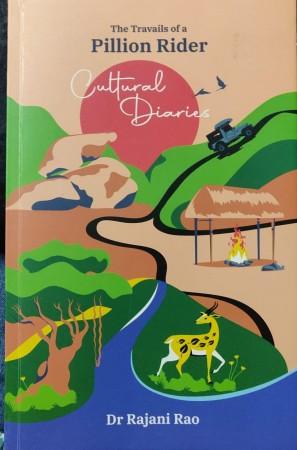A pillion rider may seem much like an actor's stunt double, with nothing as exciting as the main player's role. But Dr Rajani Rao happily dismisses the notion with her trilogy on travels as a pillion rider. Benefits can be much more than surviving an elephant charge in the jungle as she realises. This travel enthusiast with a doctorate in Environmental Philosophy has done what most of us who travel wish to do, but fail to do. Write.
The books give ample advice and tips to those wanting to set out on similar voyages. The dos and dont's are sure to come in handy, as also the information about the places and people. It is also has as much for the armchair traveller who would rather visit nooks and corners of the nation from the living room.
How travelling can turn one into a philosopher

But what is different and laudable about this travelogue is the way Rajani draws from ancient Indian scriptures to reveal what our ancestors knew about living in sync with nature, as also provide solutions to many of the challenges facing us today when we have successfully depleted resources, polluted many and abused the remaining. The book, as the author says, is proof of how travelling can turn one into a philosopher.
The author is lucky in that she has a very committed, experienced and reliable companion and rider/driver in Bali, her friend. That, as some will say, is half the journey by itself. A retired computer teacher with a passion for travel and handy knowledge on the roads, Bali is reassuring company.
Rajani has documented her experiences with the detail of a forensic analyst, capturing every event, big or small. As a result, one may find some tedious facts that seem irrelevant, something that could have been avoided with a tighter editing. The interspersing of the journeys with the Vedic knowledge may seem disjoint with the ancient texts popping up suddenly, but the philosophical interjections make up with their wealth of ancient wisdom.
Trilogy -
Cultural Diaries
Coastal Diaries
Camping DiariesAuthor: Dr Rajani Rao
Published by The Write Place
The first in the series is The Travails of a Pillion Rider -- Cultural Diaries, where she begins with a trip to Kerala and around, in search of scholars associated with Athirathram Yajna, a ritual to purify the surroundings. She then goes on to Nashik in search of an answer to some questions on Aranya Kanda, and back to Karnataka and surrounding regions to trace Emperor Ashoka's reach in the south.
With her keen observation and imagination, the author makes her journeys worthwhile for the virtual traveller by tickling the thinking nerve. Why for instance, would Ashoka or his followers choose to place edicts on top of hills that saw few passers-by? Why, indeed?
Rich variety of experiences
The second book is the one on Coastal Diaries, where she covers the Indian coast of around 11,000 kms in 52 days where the social message of plastic misuse and waste was taken up by the duo. The third one, Camping Diaries sees the author combine a few journeys to Ladakh, Western Ghats, Kanyakumari, with similar messages like avoiding food waste, etc taken up en route. Biking, cycling, coracling, off roading,... the rich variety of experiences make for a wholesome travelogue. Perhaps it is only the Indian Railways that may hold a grouse!
An eco-conscious traveller is what she calls herself, and hopes to inspire her readers to become by awakening a sense of environmental responsibility. The social messaging during the expeditions are a useful idea. Even a handful of converts could make a difference.
It is clear that the author is influenced largely in her environmental thinking by the Honnemaradu couple, Swamy and Nomito, with their focus on living in harmony with nature and learning from Her.
Simple living, reliance on one's own hidden strengths, persevering against all odds, binding respect for nature, team work, etc are what the founder duo of the The Adventurers, a Wilderness School (on the banks of Sharavathi of the Linganmakki reservoir in Karnataka) propagate. It is evident that many of these attitudes come in handy during long voyages like the ones the author undertook.
The strength of the trilogy comes from its uniqueness. When she is citing texts from Manusmriti, Upanishads or the Vedas, the summarising speaks for the author's adeptness at Indian philosophy. It made me wonder, like Goldsmith's rustics in awe of the Village Schoolmaster.
(The books are published by The Write Place)

















